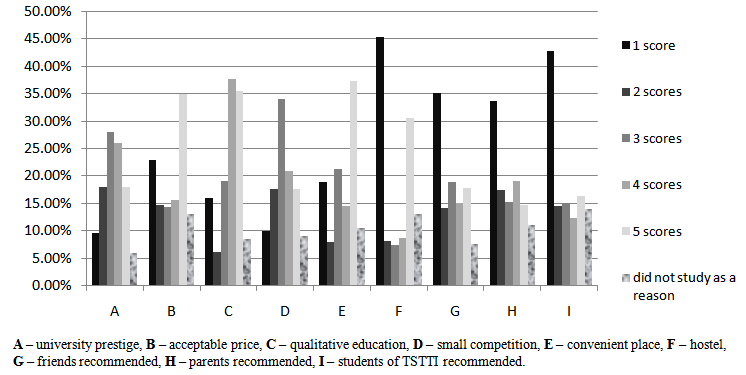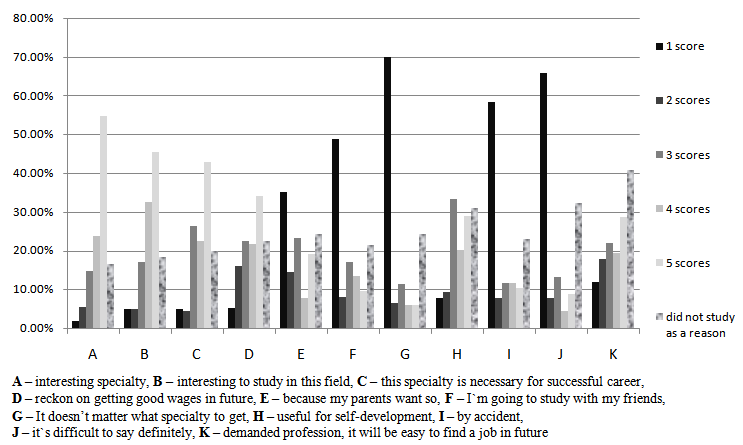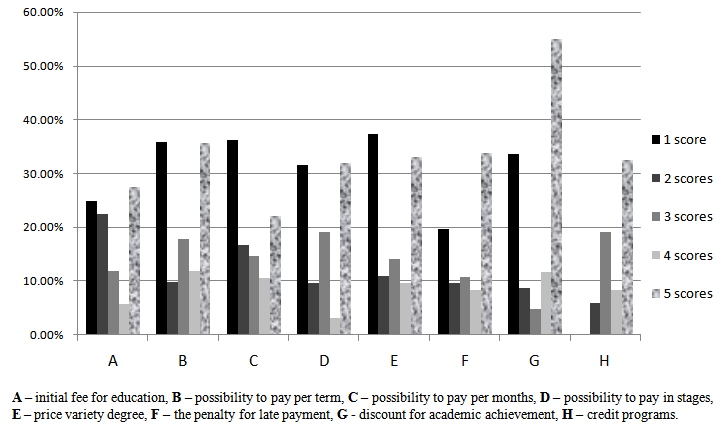-
Paper Information
- Next Paper
- Previous Paper
- Paper Submission
-
Journal Information
- About This Journal
- Editorial Board
- Current Issue
- Archive
- Author Guidelines
- Contact Us
Management
p-ISSN: 2162-9374 e-ISSN: 2162-8416
2013; 3(7A): 24-28
doi:10.5923/s.mm.201310.04
Factors Influencing Choice of Russian Educational Institution by Consumers
Olga V. Grishenko, Tatiana. V. Loginova, Anastasia. A. Vesyelaya
Economics and Business Chair, Taganrog State Pedagogical Institute named after A. P. Chekhov, Taganrog, 347936, Russia
Correspondence to: Olga V. Grishenko, Economics and Business Chair, Taganrog State Pedagogical Institute named after A. P. Chekhov, Taganrog, 347936, Russia.
| Email: |  |
Copyright © 2012 Scientific & Academic Publishing. All Rights Reserved.
The paper is devoted to defining the factors that influence the enrollee’s choice of educational services of the university, as well as receiving information for the organization of marketing complex of the university. To create a complex portrait of the consumer of educational services of the university it was necessary to find out not only the age and sex, social and geographical characteristics of the subjects of consumption, but also to identify the motivational factors most influencing the choice of the university. As a result of the analysis of data collected in the process of questioning it was revealed that consumer of educational services of the university is interested in meeting his personal requirements in education on the basis of the system of independent values. It was found that consumers’ choice is influenced by functional, emotional, representative and relative values. Consumers are mainly interested in meeting cognitive requirements of the person, in getting professional status, although there is quite a large proportion of students undirected to study at this university. The correction of settings, goals and values of producers (employees of educational institutions) and consumers of educational services will partially allow solving the identified problems.
Keywords: Educational Services Marketing, Personality-consumer, Motivation Factors, the System of Consumer’s Values, a Complex Portrait of a Consumer, Perceived Value of Educational Service
Cite this paper: Olga V. Grishenko, Tatiana. V. Loginova, Anastasia. A. Vesyelaya, Factors Influencing Choice of Russian Educational Institution by Consumers, Management, Vol. 3 No. 7A, 2013, pp. 24-28. doi: 10.5923/s.mm.201310.04.
1. Introduction
- It can be stated that the educational services market has been formed and is being dynamically developed at the present time in Russia. It is characterized by a particular competitive environment and the target audience. The famous Russian scientist in the sphere of educational marketing Shevchenko A.D.[1] remarks that marketing researches in Russia are at the stage of formation and theoretical comprehension. Not more than 10 of marketing researches are published per annum. Most of them are of theoretical character, therefore the inculcation of marketing ideas into the activities of educational institutions is an innovation for the economic science and practice in Russia. This peculiarity is mentioned in the works of many authors (P. Cose, Y. Hansmann, B. Weisbrod, E. James).Although such organizations have the right to receive income from a variety of activities they should be directed to the solution of problems related to the development of educational activities. From this it follows that "achievement of business objective is possible for non profit organizations having social relevance of its work and close relationship with the consumers. There is the collaboration and the development of relations between entities in the market for non-commercial products but not the material gain. If educational services are provided on a commercial basis the laws of classical market are applicable to them.” (Pankhruhin A.P)[2]. The application of marketing conception orientates the participants of the market upon the observation of the variety of interacting and often differently directed factors such as demographic processes, social and cultural factors, scientific and technical progress, political and international ties, natural and geographical conditions etc.Thereupon each subject of market relations is interested, on the one hand, in adaptation to market requirements as much as possible , and on the other - in active influence upon it, protecting own interests, that also is one of marketing principles.Such authors as Volkova M.M., Grenhang K., Cornelissen T.[3] state that there are two factors impeding the adaptation of marketing thinking and behavior in Russia: the experience absence and imaginary conflict with the national ideology of non-recognition of consumer society. But the correct marketing ideas mean not only an endless development of desires and demands but first of all the maximal approach to the quality of work to the demands of the consumer.As to requirements for education, behaviour and interests of the consumer in the market of educational services as a whole and in universities in particular here is a process of accumulation and ordering of empirical data, formation of scientific school of marketing at the moment.Consequently, constantly varying consumer inquiries can be considered as a source of innovative development of educational institution.In Russia the work by Blackwell P.D., Miniard N., Angel J. [4] the most recognized one. In marketing there much attention is paid to inspection of consumers, their classification, studying of their preferences and needs.One of the most recognized books on this theme published in Russia is "Consumer Behavior" by Blackwell P.D., Miniard N., Angel J.[4]. Pankhruhin A.P.[5] makes the classification of the types of consumers of educational services: persons, organizations and the organs of management. Each of these types has its own peculiarities and dictates its special demand to marketing.There are some special features of marketing on such a market:- heterogeneity of requirements, tastes, priorities and problems of consumers, that suggests holding the more detailed segmentation;- multiplicity and informality of information sources as well as those involved in the decision - parents and other family members, friends, acquaintances etc. make problems in product promotion;- individuals as the subjects of the decision-making may be the least informed, organized, target-oriented in the course of their choice.( Ref.[3])Analysis of potential consumers of educational services is minimum necessary to maintain a certain level of demand. It helps to identify not only their attitude to prices, but also to determine the level of interest in it.The aim of the given research is the study of educational demands, behavior and interests of a consumer at the market of educational services of higher educational institutions for accumulation and systematization of empiric data.For the realization of this aim the following tasks are formulated:− to define the factors on the basis of which a school-leaver chooses his future specialty and the institute of higher education;− to reveal the characteristics of educational services which are important for the consumer in the process of studying after perchaising them.The interrogation has been performed concerning the ranks of values according to the system of values by Sheth-Newman-Gross (Sheth, Newman and Gross, 1991, р. 18-25), which has been widened by G.V. Astratova[7] applied to educational services of higher school adapted by Lagutina E.E.[8]: functional, emotional, associative, relative, cognitive, representative values.
2. The Study
- It was important to determine the volume of participants for the study. For this the authors used the recommendations of well-known experts in the field of qualitative and exploratory research in the service sector of M. Kinnelya and J. Mack Dougal. In total 200 students of Taganrog Pedagogical Institute named after A. Chekhov participated in the study. To implement the objective of consumer research method of analysis and interpretation of questionnaire results was used Ref.[4]. Time to complete the questionnaire was 15 - 20 minutes.The questionnaire included open and closed questions. The questions were divided into two sections: personal (gender, age, family income, wealth) and special which allow to identify the factors that influence the choice of the university. Processing questionnaires estimation of the factors that influence the choice of the educational services of the university was carried out on the basis of dividing them into two groups: external to the university (the socio-economic importance of the profession in society, job security, wages, etc.) and internal factors (qualification of the teaching staff, the quality of the educational process).Motivational factors determine the individual’s choice of the region, educational institution, its focus on education both as on the final goal and as on means of obtaining other benefits. In marketing identification factors motivating consumers to purchase a particular service is the most important.
3. Results
- The results of the analysis of the questionnaires related to the block of personal questions allowed to create a portrait of our education services consumer. According to the geographical factor the amount of institute services consumers consists of 50% of the residents of suburbs. This is natural, since university positions itself as a "manufacturer of frames" for rural schools.More than 80% of students are female, as traditionally women are teachers in Russia.Market segmentation by demographic characteristics revealed that a core group of students receiving the first degree of high education are people from 18 to 22 years old. This age group is the most susceptible to getting additional education as noted by many researchers.This makes inclusion questions of additional types of educational services for creation and development of the university marketing complex relevant. Making a choice on the market, the consumer is guided by a particular system of independent values. In the study there was the special questionnaire block oriented to such questions.To the questions to assess the basic properties of educational services (functional value of services): the level of prestige of the university, the quality of education at the university the following answers were given.The quality level of education attained in that institution is not lower than in other educational institutions of the city as stated by 36.2% of respondents, and this factor is important for them in making decision on the choice of an institution (Fig.1). Associative value of educational services specified by profession's status in the social structure and by possibility of self-realization has been identified on the basis of the following responses. Most of the students (49.6%) believe that the level of prestige of a profession in the society is average.The most significant of selection factors when making decision on the purchase of educational services of the institution is the convenience of its location - 37.4% of respondents. This factor is external according to the university. It is important to identify the relative value of the purchased services in the study of consumer motive.It characterizes the perception of the degree of satisfaction needs of a consumer, and therefore the service becomes functional or associative value (the reason for higher education). This information allows to make a decision about the positioning of the educational services of the university. Maximum points (42.9%) were given to the necessity of getting this specialty for a successful career by a majority of respondents.This allows to draw conclusions about the conscious choice in this field of study.On the second place there is a factor of future wages - 34.2%. The authors' conclusion about awareness in choice of specialty confirmed that 70.2% of students rated the factor of indifference to the choice of specialty - 1 point, and 58.4% negatively evaluated the haphazard choice (Fig. 2).Emotional value is conditioned by emotions caused by pre-, during, and after acquisition of educational services. The questionnaire showed that emotional value is an important factor for the respondents. Their interest in specialty is estimated to 5 points by opinion of 55% of the respondents. However, only 40.5% of respondents assessed interest as factor in learning by 5 points.In our opinion, this may indicate a mismatch representations of students about the specialty (emotions to purchase) and their perceptions of learning process (emotions at time of purchase), or lack of information of an applicant about acquired education service.The study of cognitive value of educational services (information on education in high school, manner, place and time of purchase educational services, etc.) allows you to get some response to the latter hypothesis. Analysis of the questionnaire data showed that the vast majority of respondents (77.5%) when choosing an educational organization, used a lot of sources of information (different types of guides for applicants, advertising, attending open lectures, etc.) choosing a university. Students` opinions, school teachers who are graduates of the institute and the information posted on the website of the University influenced their choice greatly. Representation of purchased services value is quite a significant factor. It was found in the responses to questions about the availability of educational services, the conditions of its receipt including cost.When filling out the questionnaire, most respondents (70%) considered their families to be a group of people with incomes below the average. An opportunity to "put off" part of income to pay for educational services in the future, and also to finance the fixed costs involved in making education is available only for 10.5% of the participants. In students` opinion analysis of the responses revealed acceptable range of training cost.
 | Figure 1. Reason importance degree of the choice of the university |
 | Figure 2. Assessment of factor importance in specialty choice |
 | Figure 3. The degree of facto importance allowing to adjust basic price |
4. Conclusions
- Thus a personality of consumer of higher educational institution is interested in satisfaction from his independent human values. His choice is conditioned by functional, emotional, representative educational services and he is generally interested in satisfaction of the cognitive demands of his personality, in obtaining a professional status, though there is a certain group of students who are «non-orientated» to study at this or that institute.And we can assume that for a significant part of students the education in the university is the only inevitable way to get diploma. Their educational desire is substituted by desire to obtain a certificate of education. To confirm this hypothesis we need more detailed research. On the personal level it results in «professional disappointment» and leads to resources loosing. For the educational institution it means the loss of orientated entrant, lowering of education prestige in general. On the state level it entails the loss of the budget means, unemployment and shortage of qualified stuff. The correction of arrangements, aims and values of producers of educational services as well as aims and values of consumers may partially solve the discussed problem.
 Abstract
Abstract Reference
Reference Full-Text PDF
Full-Text PDF Full-text HTML
Full-text HTML